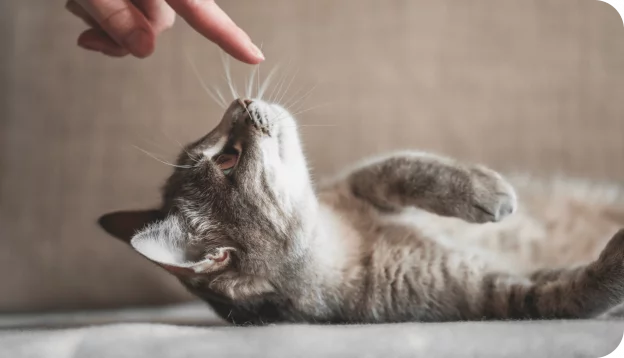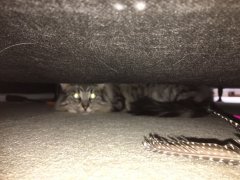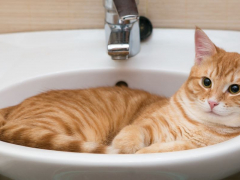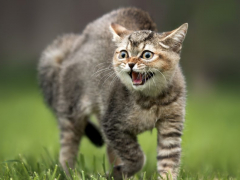Cat Behavior
From resolving problems like urinating outside of the litter box to avoiding scratches during playtime, knowledge about feline behavior is a cat care essential.
Browse our cat behavior articles for expert-written, expert-reviewed guides that will help you troubleshoot and understand your cat’s habits, motivations, and moods.

Popular Topics
Aggression
Peeing Outside the Box
Cat Language
Sleep
Vocalizations
Stress
Catnip
Kneading
Purring
Biting
Aggression
Aggression is a threatening behavior in cats, often a response to stress, pain, conflict between cats, fear of humans, territorial fights, or redirected aggression. In younger cats, play aggression is a common issue and requires teaching the kitten how to play appropriately and safely. Treating the aggression may require reducing stress, using synthetic pheromones, a medical exam by your vet, and consulting a feline behaviorist.
Learn More: 10 Causes of Aggression in Cats and How To Help
Peeing Outside the Box
Cats who do not use the litterbox may have a health or behavioral issue. They may stop using their box if it is too dirty, small, in a noisy place, or if there is a new litter substrate. Conflict between cats and underlying medical problems are also possible causes. Your vet can examine your cat and check a urine sample for signs of infection or inflammation if that is suspected.
Cat Language
Cats communicate through vocalizing, body language, and scent marking. Vocalizing involves familiar sounds such as purring, meowing, hissing, and growling. Body language focuses on ear, eye, and tail position along with body posture. Urine spraying and scratching are both examples of scent marking and can pose a problem when done in the home.
Learn More: What Your Cat’s Tail Can Tell You
Sleep
Cats sleep for 12-18 hours a day, sometimes even longer, and they’re polyphasic in their sleeping pattern; this means instead of one long sleep, they sleep multiple times per day. Cats are also crepuscular, which means that they’re most active at dawn and dusk, so they will usually sleep at other times of the day.
Learn More: 10 Tips To Train Your Cat To Sleep All Night
Vocalizations
Cats use vocalizations to communicate with us and other cats. Vocalizations may be happy sounds such as purring, chirping, and gentle meowing. If cats are scared or feeling threatened they may vocalize with hissing, growling, and howling. It’s important to interpret your cat’s vocalizations so that you know if they want to be approached or if they want to be left alone.
Learn More: 7 Common Cat Vocalizations and What They Mean
Stress
Stress is a common cause of behavioral and medical problems in cats. Many things may cause stress in cats including a change in routine, a house move, a new baby in the home, or conflict between cats. Stressed cats may hide away and act differently. Synthetic pheromone diffusers and addressing the cause of stress may help your cat feel more at ease.
Learn More: Stress in Cats: Causes, Symptoms, & Treatment
Catnip
Catnip is a herb, part of the mint family, that is used as a treat. Most cats love to rub, roll, and zone out around catnip. They may vocalize and act excited around a catnip plant. These effects are temporary and usually wear off within thirty minutes.
Learn More: What Is Catnip? Why Cats Like It
Kneading
Cats knead by rhythmically moving their front paws up and down, also known as “making biscuits.” They do this when they’re content and happy and will often do this on their owners. Kneading is usually a sign of contentment. Cats also sometimes do this to stretch, soothe themselves, and deposit pheromones from their paws.
Learn More: Why Do Cats Knead Their Owners?
Purring
Cats make a purring noise for several reasons, and the most well-known is when they are happy. While this is usually a sign of contentment, cats can also purr when they’re in distress or trying to communicate.
Learn More: Why Do Cats Purr?
Biting
Cats may bite in self-defense if they feel scared or threatened or as a form of inappropriate play. Biting can become a serious behavioral problem, and it’s best to seek professional help from your vet or a feline behaviorist early on if you notice frequent biting.
Recent Forum Discussion
Behavior
Why Does My Cat Chew on Soft Things and How Can I Stop It?
Hi everyone—I've noticed my cat has started chewing on extra-soft or fragile surfaces like paper towels and lightweight toys, especially when he's bored. Has anyone experienced this? What did you try that actually helped redirect this behavior? Would love any suggestions or product recommendations!
Latest Comment Posted:
5 days ago
Melina Grin
1
Behavior
Feliway alternatives that work?
I’ve had okay luck with the feliway diffusers but I’m moving for the first time with my pair of 2 and 3 years old kitties. And my boy cat is very sensitive, so much so that he pees in non litter box places when he sees a cat outside. And I’ve have friends tell me vets have told them not to use the f...
Latest Comment Posted:
2 weeks ago
Melina Grin
1
Behavior
How to proceed with a new kitten?
We should only go ahead with the blanket swap procedure if we're confident that the new kitten is negative for panleuk, as it's highly contagious, correct? Do the vaccines eliminate the virus completely, or is there a possibility that it can 'hide' or 'move' within the cat? If the kitten has been te...
Latest Comment Posted:
1 month ago
Melina Grin
3











